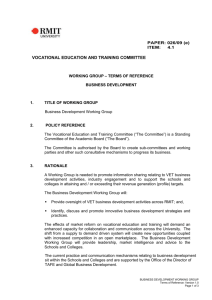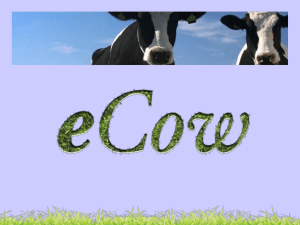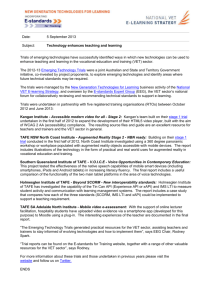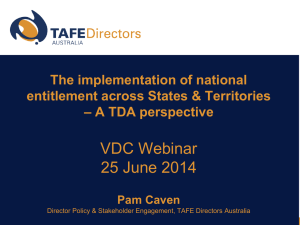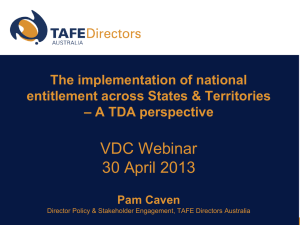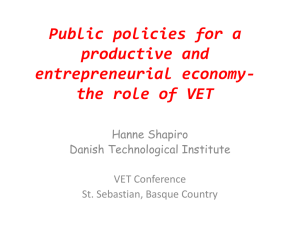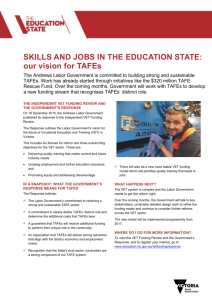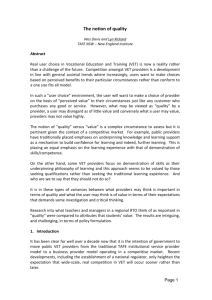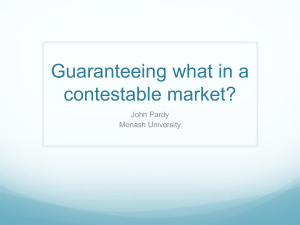Thurs-A-1120-M-Brown
advertisement
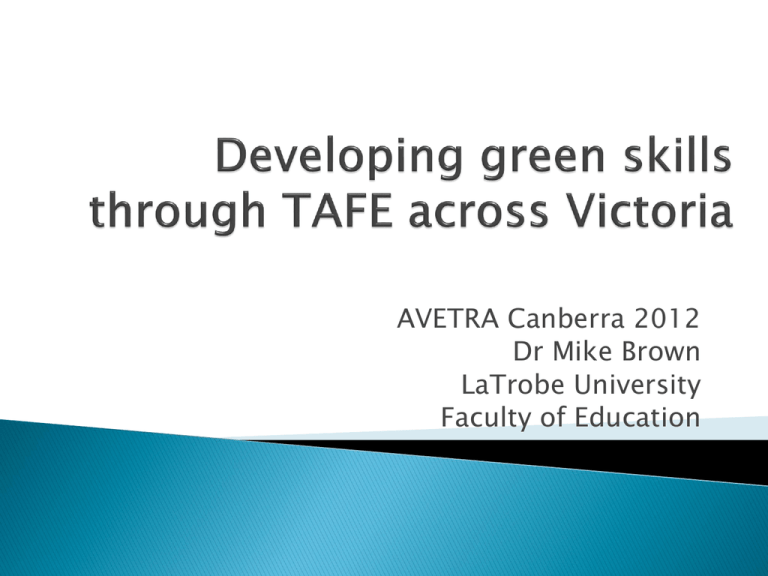
AVETRA Canberra 2012 Dr Mike Brown LaTrobe University Faculty of Education How are job roles changing in the transition to a low carbon economy? How are TAFE training programs changing to develop ‘green skills’? How are the TAFE staff’s professional development needs for understanding green skills, being met? An overview of the study Context and background Other literature, other studies Methodology Findings Discussion Conclusions A larger study with a national sample of VET providers to investigate how job roles and work practices are changing along with a review of how the development of green skills is occurring In situ methodological carriage The push for change: the need to transition to a low carbon economy Some of the big picture arguments from Giddens (2011) and Chandler (2011) The Australian response the need to transition to a low carbon economy The GSA and the GSA Implementation Plan This paper starts to explore the extent to which green skills are being developed through some TAFE Institutes in Victoria. Ice core data (primarily from Antarctica) tells us that for all human history, atmospheric CO2 was around 275 parts per million (ppm) until about 200 years ago, when civilization began to dig up and burn coal to fuel the industrial age. Today the CO2 level recorded at the Mauna Loa Observatory in Hawaii – the longest record for direct atmospheric measurements is nudging 390 ppm, well over the 350 ppm many scientists and some governments now identify as the ‘safe’ upper limit, and which was last seen around 1988. Turning the ship around will be some feat, one which gets harder with every passing day, though we are assured it’s not impossible, assuming there is the will to do it. The UNEP (2011) report defines the Green Economy as ‘an economy that results in improved human wellbeing and reduced inequalities over the long term, while not exposing future generations to significant environmental risks and ecological scarcities’ (pg.2). DEEWR (2011) in their report on Australian Jobs explains, ‘green skills, or skills for sustainability, are the professional and vocational skills, as well as the generic skills (such as sustainable approaches, innovation and problem solving) required for new green jobs and the greening of existing jobs across all industry sectors as a response to climate change and sustainability imperatives’ (DEEWR 2011: 31). Climate Commission (2011) ‘this decade is critical’ and Australia must decarbonise its economy and move to clean energy sources by 2050. The longer we wait the more difficult and costly it will be. This is the basis of calls for a transition to a low carbon economy. High amongst the strategies to do this is the setting of targets for a lowering of carbon and pollution emissions, and also targets for the levels of alternative and renewable energy being used. This paper starts to explore the extent to which green skills are being developed through some TAFE Institutes in Victoria. The GSA: the Green Skills Agreement The development of green skills ◦ What, where, how and why The development of green skills within VET ◦ Training packages, programs ◦ VET students and graduates ◦ Professional development of VET teachers and managers Climate Institute (2011) Rafferty & Yu (2010) ACTU (2008) Hatfield-Dodds et al (2008) GSA and GSA Implementation Plan GSA has four objectives Donavan (2010) summarised these as, the development of national standards, upskilling the VET workforce, revision of training packages, and transition strategy for vulnerable workers. Training packages, and VET programs ◦ (Toohey 2010) VET students and graduates ◦ DSF 2008 & 2011; Sack 2012 Professional development of VET teachers and managers ◦ Ithaca Group 2011 Three key questions . . . How are job roles changing in the transition to a low carbon economy? How are TAFE training programs changing to develop ‘green skills’? How are the TAFE staff’s professional development needs for understanding green skills, being met? Four groups of participants, Industry and community stakeholders (20); VET managers (20) TAFE teachers (22) TAFE students (19) Sample size of eighty-one (N=81) Semi-structured focus group or individual interviews, around 30 minutes each, fully transcribed, and thematically analysed A larger study with a national sample of VET providers to investigate how job roles and work practices are changing along with a review of how the development of green skills is occurring In situ methodological carriage Transport and logistics Pastry-cooking and baking Timbertown in Gippsland CEOs of Energy companies Local councils A plant operator Alternative Energy retail suppliers and installations Sustainability Victoria Master Plumbers Association: Four main drivers: lower costs and the business case; A viable alternative Better for health and wellbeing Better for the environment and part of the transition to a low carbon economy (but don’t say ‘green’) Generally no worries changing and making adjustments ‘Just tell us what you want and we will do it’ Implementing changes to training packages, changes to courses and programs Two Hospitality departments at two different TAFEs Full support and finding money, to no support and wont even bother looking for money Generally very supportive of PD Jobs changing and adaption: Childcare industry, new call to educate the four year olds; Plumbing: Master Plumbers Assoc; new products and new practices, bulk buy strategies, some real champions Electrical: made an off grid simulation, the trailer Building trades: bricklayers, carpenters, Performing arts: travel is an issue. Cooking hospitality Farming: new practices, water usage, tree planting ?? Sustainability Officers in large companies Some teachers more than others There is evidence of many initiatives but it is still possible to have no change Plumbing, Electricians, Signwriter, Carpenters, Cabinetmakers, Land management and conservation, Renewable energy students, Boatbuilder Generally seeing some changes Double agendas of cutting waste and inefficiency which also cuts costs – the business case Green skills being incorporated into their courses in general and specific ways. This study analyses data from four categories of stakeholders and participants in order to provide insight into the actual perceptions and practices around sustainability across five TAFE Institute. Some new jobs are emerging and while these are thought likely to increase in the future, most change is occurring within existing jobs and in the application of the skills. Clearly markets are growing in renewable energy, energy efficiency, sustainable water systems, green buildings, and waste and recycling, with all jobs seemingly starting to consider and incorporate ‘skills for sustainability’. There is evidence of many initiatives but it is still possible to have no change A larger study with a national sample of VET providers to investigate how job roles and work practices are changing along with a review of how the development of green skills is occurring
